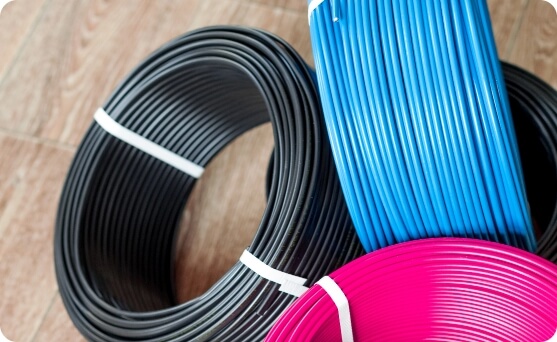Heating Cables

Heating Cables
The winter months can be very stressful for many homeowners. When melting snow and ice refreezes, it can lead to costly damage to roofs, gutters and gutter guards. It can also pose a serious risk of injury from slips or falls.
Heating cables can be used for a wide range of applications for your home, including roof and gutter deicing, floor heating, pipe freeze protection and snow melting on walkways, patios and driveways.

Roof/Gutter Heating Cables
One of the most common issues during winter months is leaking water from roofs after a snow or ice storm. In most cases, the leak is caused by an easily preventable issue: an ice dam.
An ice dam is a ridge of ice that forms at the edges of the roof (including gutters). As snow and ice build up, the dam prevents melting snow and ice (water) from draining off of the roof properly. The water that backs up behind the dam can leak into a home and cause significant damage to the roof, shingles, ceilings, walls, insulation, and more. If the ice dam becomes too heavy, it may lead to even more damage to your roof, gutters and downspouts.
Roof heating cables act to prevent the melt-off from refreezing, thus eliminating an ice dam from forming and instead of backing up, the water drips to the ground.

Snow Melting Heating Cables
Snow melting heating cables are specifically manufactured to be durable because they are designed to melt snow and ice on high traffic areas such as driveways, walkways and patios. This type of heating cable is an environmentally friendly alternative to snow removal because they limit the need for using sand or salt.
Some manufacturers are taking advantage of smart technology and can link to a weather app to control the system based on real-time weather conditions.
Snow melting heating cables are a great option for anyone that doesn’t want to manually remove snow, or to minimize the risk of slips and falls.

Floor Heating Cables
Floor heating cables are electric cables that heat material rather than air. They are installed between the subfloor and the floor covering and can be controlled to adjust the temperature or turn the cables on or off.

Pipe Freeze Protection
This type of heating cable is typically installed in areas that are poorly insulated such as exterior faucets and perimeter walls. The “pipe tracing” consists of a heated wire that prevents non-water flowing pipes from freezing.
All heating cables are available in one of two categories: self-regulating or constant wattage.

Self-Regulating Heating Cables
Contrary to what the name implies, self-regulating heating cables will not turn themselves completely on or off. The amount of heat used is inversely related to the external temperature in order to maximize energy efficiency. The cables automatically draw more energy to heat the cable when it’s cold and use less energy when it’s warmer. Because of this, self-regulating heating cables come with a variety of accessories such as controllers, connectors and junction boxes.
Self-regulating heating cables are best used on any type of roof because the cables can overlap without the risk of fire. They are also great for pipe freeze protection.
If a cable becomes damaged, it can be easily repaired without the need to replace the entire circuit.

Constant Wattage Heating Cables
Also referred to as standard heating cables, this type of heating cable system controls the output of heat via a thermostat for maximal functionality. The cable plugs in and generates the same amount of heat, regardless of the external temperature.
Constant wattage heating cables are activated in advance of snowfall, initiating the heating process to promptly melt the falling snow.
Constant wattage heating cables are great for snow melting on driveways, walkways and patios because they are able to continually melt snow and ice under concrete, asphalt, pavers and mortar, even during extreme weather conditions and temperature fluctuations.
Floor heating benefits from constant wattage because the output of heat can be controlled by a thermostat for maximum comfort, when needed.
Proper installation of heating cables by one of our skilled professionals can provide you with peace of mind knowing that your home is safe and won’t become damaged by the buildup of snow and ice this winter. Whether you are looking for self-regulating or constant wattage, Honey Do Men offers heating solutions for every need and budget.
Call us today to schedule a complimentary consultation!
TESTIMONIALWhat Our Customers Say About Us
Common Heating Cable Questions
Roof and driveway heating cables are electrical systems designed to prevent the buildup of ice and snow on surfaces such as roofs, gutters, downspouts, and driveways.
They consist of electric heating elements encased in durable cables or mats that are installed directly on the surface to be heated.
When activated, the heating cables generate heat, which melts snow and ice, allowing water to flow freely and preventing the formation of ice dams, icicles, and slippery surfaces.
To Schedule A Complimentary Consultation With One Of Our Specialists
Give us a call today.
Contact us
